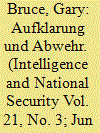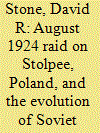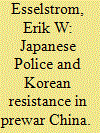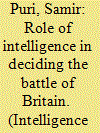|
|
|
Sort Order |
|
|
|
Items / Page
|
|
|
|
|
|
|
| Srl | Item |
| 1 |
ID:
075300


|
|
|
|
|
| Publication |
2006.
|
| Summary/Abstract |
The following article traces the development of East Germany's secret police, the Stasi, during the reign of Ernst Wollweber, the second Minister of State Security. By examining key Stasi operations during this period, notably the 'concentrated strikes' strategy following the June 1953 revolution, the campaign against Ostbüros, and operations to secure the economy, and by examining Wollweber's major speeches, it argues that Wollweber's reign was a decisive one for the Stasi because of the integration of intelligence gathering outside of East Germany (Aufklärung) with domestic surveillance (Abwehr). Although this balance shifted toward external duties in Wollweber's landmark August 1955 speech, Wollweber continued to promote integration of the two duties, in particular by anchoring the intelligence gathering duties in the local-level domestic structures of the Stasi.
|
|
|
|
|
|
|
|
|
|
|
|
|
|
|
|
| 2 |
ID:
075298


|
|
|
|
|
| Publication |
2006.
|
| Summary/Abstract |
In August 1924, a Soviet-sponsored raid on the Polish town of Stolpce to free two imprisoned communist activists went badly wrong. Though the ruling Politburo had not authorized this raid, the public embarrassment and diplomatic consequences led the Soviet government to overhaul its program of ‘active intelligence’, halting peacetime attacks on neighboring states in favor of quieter preparations for wartime sabotage and diversion under the authority of the Red Army's Intelligence Directorate. At the same time, the Politburo organized stay-behind groups in Soviet border regions to prepare for the possibility of enemy occupation.
|
|
|
|
|
|
|
|
|
|
|
|
|
|
|
|
| 3 |
ID:
075303


|
|
|
|
|
| Publication |
2006.
|
| Summary/Abstract |
The CESID was created during the transition to democracy with obvious shortcomings in its administrative, judicial, governmental and parliamentary controls. These shortcomings contributed to the scandals of 1995 and 1998 that made deputies aware of the need for improvements in its supervision, although the timid initiatives that were finally adopted did nothing to improve the situation. The reform of 2002 that transformed CESID into CNI was presented as an opportunity to perfect supervision of the intelligence services. However, its achievements have not been as ambitious as might have been hoped. Supervision ever since the transition to democracy is still unfinished business, as was clearly demonstrated by the difficulties experienced in the work of the commission of inquiry into the terrorist attack of 11 March 2004.
|
|
|
|
|
|
|
|
|
|
|
|
|
|
|
|
| 4 |
ID:
075299


|
|
|
|
|
| Publication |
2006.
|
| Summary/Abstract |
Based on the records of Japanese Foreign Ministry police forces, this article describes a failed attempt by Japanese consular police in south Manchuria during the early 1920s to suppress the Korean independence movement in exile through the employment of local collaborators. Implemented because the Chinese government did not recognize the legal legitimacy of Japanese consular police operations on Chinese soil, this counter-insurgency program reveals the lengths to which Japanese consular authorities were willing to go in the search for solutions to their perceived national security threats in Northeast Asia long before the outbreak of full-scale war with China in the 1930s.
|
|
|
|
|
|
|
|
|
|
|
|
|
|
|
|
| 5 |
ID:
075301


|
|
|
|
|
| Publication |
2006.
|
| Summary/Abstract |
During the Second World War Nazi Germany presented British intelligence with two intellectual challenges: to acquire its tactical‘secrets’ and to comprehend the strategic ‘mysteries’ of its commanding elite. The former were hidden, but knowable through the miracles of Ultra. The latter – Hitler's strategic intentions – were by contrast virtually impenetrable. Consequently, between 1940 and 1943 British intelligence used the talents of an astrologer, Louis de Wohl, who claimed – wrongly – that Hitler's strategic plans were astrologically inspired. However, as de Wohl's star began to wane he was talent-spotted by the Special Operations Executive (SOE), which employed him to disseminate black propaganda. He consequently travelled to the United States where, in tandem with British Security Co-ordination, he undermined American confidence in the invincibility of Hitler through astrological prognostications. This article aims to demonstrate that although Britain had unprecedented access to Germany's tactical ‘secrets’, the ‘mysteries’ of Hitler's strategic mind-set remained just that.
|
|
|
|
|
|
|
|
|
|
|
|
|
|
|
|
| 6 |
ID:
075302


|
|
|
|
|
| Publication |
2006.
|
| Summary/Abstract |
The successful employment of German air power in the Battle of Britain was greatly hindered by abysmal intelligence. The Luftwaffe never developed an accurate picture of enemy strengths and weaknesses, and this contributed to preventing it from bringing force to bear at the decisive point of battle. Although certain aspects of British intelligence were equally flawed, it ultimately proved itself to be an indispensable adjunct to the operational success of Fighter Command. This article focuses on the contribution made to Luftwaffe and RAF operations during the Battle of Britain by their respective intelligence gathering institutions. It is an investigation into the extent to which activities in the realm of intelligence can explain the eventual British victory.
|
|
|
|
|
|
|
|
|
|
|
|
|
|
|
|
|
|
|
|
|